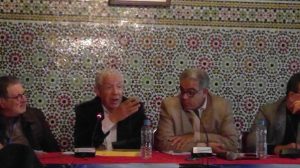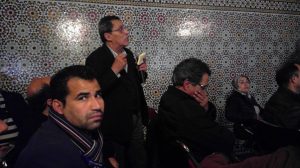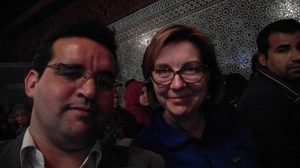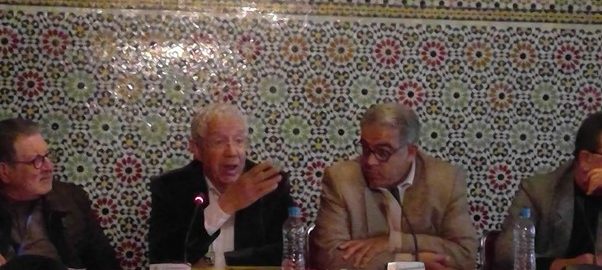Two members of the TMC team, Florence and Jamal, attended the latest National Film Festival in Tangier (FNF, 3-11 March 2017). The annual festival is organised by the Centre Cinématographique Marocain (CCM) in association with the National Association of Film Critics and local partners in Tangier. As Florence argued in a previous post for this blog, this year’s festival was characterised by the screening of many wonderful films, however, there were also films that raised questions about the quality and direction of Moroccan cinema.
On Sunday, 4 March, the Moroccan Chamber of Film Producers organised a roundtable as part of FNF. The roundtable helped illuminate some of the challenges facing Moroccan cinema today. The table was chaired by Jamal Souissi, the vice-president of the Chamber. In his introduction, Souissi warned that the incessant closure of cinemas in Morocco today is not only an economic problem, but also a social one.

The film critic and Rabat-based academic Omar Khammar was the first panellist speaking. He observed that although Morocco has many film schools today, the number of filmgoers is decreasing year after year. The digitisation of cinemas is not enough to bring back people to the cinemas. The problem needs to be tackled at the source. For Khammar, the digital revolution has upset the film scene, and Moroccan cinema needs to adapt to this revolution. Some people have built film screening rooms in their own homes. In addition, piracy is a big problem in Morocco, which will also not be solved by the digitisation of cinemas. This has been a key component of the CCM vs Pirates battle over the last two decades. The speaker also drew attention to the fact today’s youth don’t appreciate the conventional length of films: the notion of time has changed, and cinema has got to adapt to this situation. The Moroccan state is also responsible for the current crisis of Moroccan cinema because it has not educated youth to love and appreciate cinema. According to Khammar, this is part of the state’s long war against culture in postcolonial Morocco. Society has been invaded by commercial culture, which in turn has made people shun culture, cinema and reading. The tax rate on cinemas is unfair and to blame for part of the complex problem of cinema closures.
Among the multiple recommendations offered by Khammar to address this situation is the call to build cinemas in the Moroccan countryside. Local councils should spend some of their money on cinema and culture. In this vein, civil society organisations need to assume their role in spreading film culture in society to combat Islamism and other forms of intolerance and radical politics among youth. In addition, some mosque imams should be discouraged from lambasting cinema and films in their Friday sermons. Finally, Khammar pointed out that film advertising is very weak in Morocco, and something needs to be done about it. It is often foreign films that we see advertised on billboards and posters. In all cases, the solution to Moroccan cinema’s crisis will take long years if not a generation to be solved.

The next speaker was Noureddine Ayouch. He started with an anecdote about an old film-house in Casablanca, which has been converted to a one-night stand hotel. Ayouch insisted on an honest diagnosis of the state of cinemas in Morocco. He also said that we need to make popular films like Road to Kabul (2011), a popular comedy about terrorism directed by Brahim Chkiri. According to Ayouch, Moroccans don’t like Moroccan films because they are not entertaining; they find them too cerebral. Another problem is that people don’t feel morally guilty when they buy pirated movies. This cuts across all social strata. The speaker also said that we shouldn’t rely on CCM money to make films. Filmmakers need to look for other financial resources to supplement funds, or make films without CCM funds at all. This is important, he said, because the CCM is also a censorship board, especially after the Islamists came to power in 2011. According to Ayouch, this has not been a good move for Moroccan cinema and society.
In the last part of his talk, Mr Ayouch offered a number of recommendations to lessen and gradually wipe out the crisis of Moroccan cinema in the globalisation era:
- VAT tax on cinemas should be reduced to 5 percent if not cancelled altogether
- The film community should directly address the King to resolve the problem of Moroccan cinema such as censorship and piracy
- Help pirate film vendors sell legal copies of films instead of pirated ones: they should be helped to integrate the formal economy
- Local councils should be encouraged to spend some of their budgets to build and support cinemas
- Moroccan television needs to grant more space to film critics and film programmes
- Moroccan film distributors need to export Moroccan films and become major actors in other film markets
- Quotas for national films in Moroccan cinemas and TV should be introduced
- Film investors need to invest in cinema in sub-Saharan Africa just like the rest of the Moroccan economic community today
- More money needs to be spent on advertising films just like in the USA: the government needs to spend money on this by helping producers and distributors
The veteran filmmaker Latif Lahlou was the next speaker. He revealed his plan to build 400 cinemas in Morocco. This gargantuan project rests on the premise that we need to focus on the local to solve the problems of national cinema. He recommended that the state makes going to the cinema affordable for the average Moroccan. Lahlou stressed the need for affordable cinemas in working-class neighbourhoods because that is where the large and real audience for Moroccan cinemas is.
The next speaker was El Ayadi, a cinema owner. He pointed out that there is no political will to reform the film sector. The crisis of Moroccan cinema has been going for 25 years. Cinema owners are burdened with taxes while nothing is being done to fight piracy and encourage people to go to the cinema. The 20 % VAT is an aberration, said El Ayadi. It is time to reduce or cancel this tax to keep the few remaining cinemas open. The other problem is that CCM treats cineplexes like Mégarama and small cinemas the same. This is killing the small cinemas. The speaker said that it is no longer viable to own a cinema. The rate of frequency is 6 to 7 percent around the year. This needs to be raised to 20 percent at least to keep cinemas viable and open. The root of the problem is that 90 percent of Moroccans can’t afford the current price of cinema tickets. El Ayadi recommended the building of more neighbourhood cinemas to reduce the transportation costs for filmgoers. He went on to reveal that popular Moroccan films like El Ferrouj (2015) by Abdellah Ferkous saved the year for cinemas.
Popular films bring in money. That is why we need to refrain from judging films. Let us leave it to the audiences to choose and watch the films that they like. The CCM therefore needs to support both auteur and commercial films like El Ferrouj and The Road to Kabul. Otherwise, cinemas would close down, said El Ayadi.
He added that Moroccans need to learn more from the French system because it works. Cinemas are doing well in France. He emphasised that the French cinema system rewards popular films with a €1 million prize to each film that reaches 1 million entries. The cinema owner agreed with previous speakers that 20 % VAT is preventing investors from building or buying cinemas in Morocco. For him, public-private investments are needed and can be achieved by getting the CCM, local councils and other public bodies to put in some money to encourage private producers to invest in cinema.
The last intervener in the routable was Tarrous, who is a film critic and activist based in Tangier. He argued that film professionals ought to listen to the Moroccan public about this question. The scene is dominated by the views of film professionals. Since Moroccan films are subsidised by the taxpayer, we must find the audience for them and keep cinemas open: “Without the audience, Moroccan cinema wouldn’t survive for very long”. It is worth remembering that part of the justification for the public support for cinema is to provide some social welfare for film professionals. However, the professionals are doing next to nothing to attract the general public to watch their films. The Tangerine critic went on to say that the subsidy system is working, but it was high time some serious policies were introduced to help cinema self-support rather than always rely on public subsidies. Moroccan cinema needs an audience large enough to support it financially. Tarrous finally recommended that the current funding system should be revoked because it is not sustainable.
Q&A
The roundtable was followed by a vibrant and rich Q&A session. Many key actors in the Moroccan film scene who were in attendance took to the floor to voice their thoughts on the crisis of cinemas across the country. For Sarim Fassi-Fihri, the current CCM director, one of the problems that his institution faces, lies in the fact that most cinema owners do not submit their financial reports to the CCM in order to have a good idea about their problems. Ahmed El Maânouni (President of Moroccan Chamber of Moroccan Film Producers) discoursed next and said that more events like the National Cinema Day are needed to encourage Moroccans to become aware of their national cinema’s problems. He added that Morocco needs to learn from France by supporting cinema at every level from production to exhibition. Mohamed Abderrahman Tazi, a filmmaker and the director of the Association of Moroccan Film Producers, reacted by saying that we need to stop expecting help from the state and politicians: “We need to help ourselves. Filmmakers must do something or lessen the pain of Moroccan cinema today,” he said. For Hassan Benjelloun, also a filmmaker and the director of Moroccan Producers Chamber, cinema owners need to programme more diverse films every day instead of one film for weeks on end. This is because the cinema habitués are the same people who come again and again. They get discouraged by repetitive programming.

Next to speak was Amina, a civil society activist. She highlighted that the crisis of Moroccan cinema is a symptom of the crisis of Moroccan modernity as a whole. Moroccan women used to go to cinemas on their own even when they hailed from traditional families. That is no longer the case, she said. Amina added that schools are the future of Moroccan cinema because we need to target young Moroccans to address the film crisis. El Othmani, a film professional, stressed the need for sociological studies about the Moroccan cinema-going public to better understand this problem. The subjective views of Moroccan film professionals will take us nowhere and cannot be the basis of serious solutions to the crisis of Moroccan cinema.
Jamal Eddine Naji, director of Audiovisual Communication at the Haute Autorité de la Communication Audiovisuelle (HACA), intervened by saying that the HACA has conducted a large-scale survey on Moroccan TV audiences. Someone needs to commission a similar survey about Moroccan film audiences. This is needed because we don’t know the audience for Moroccan cinema. He added that there is also a need to revitalise Moroccan cinema by creating a star system to help it stand on its own feet. Naji concluded that Moroccan filmmakers and actors in the film sector are called upon to use technology effectively in the digital revolution. Omar Ait Mokhtar, a film critic, festival organiser and film club veteran, retorted that Moroccan and international academics and students have carried out fieldwork on Moroccan cinema. What needs to be done is reading and translating some of their recommendations into reality.
Another speaker called for a national front for the defence of cinema to protect directors and film students from certain political currents and unemployment. The rich audience interventions continued with Mellouk, a film critic, revealing that Moroccans spend 250 MAD per month on audiovisual consumption: “That is enough. We just need to bring some of that money back into cinemas”. He explained that if we put together all that is spent on audio-visual production and advertising in Morocco, we get 100 billion MAD. This is a big industry. Cinema needs to place itself at or near the centre of this industry. The creative industries are major employers for the future. Bouchta Farqzaid, film critic, decried that piracy is killing Moroccan cinema. It has gone beyond pirated CDs. Hard drives with over 500 films are on sale on the black market. Boudih, a cinema owner, pointed out that cinemas cannot stand the situation anymore. The owners need urgent decisions rather than discourses and more roundtables. Finally, Benkirane, a film distributor, said that we need to save what can be saved. The social and economic living condition of Moroccans need to be improved to allow them to go to the cinema more often. Moroccan media and schools also need to encourage people to go to the cinema.

In conclusion, attending the National Film Festival in Tangier was very productive for the TMC team. The national festival is just what the Marrakech International Film Festival is not. In Tangier, there are roundtables and daily press conferences and discussions after each film screening. The Tangerine crowds are small but rich and friendly. Florence and I were witnesses to candid discussions about the state of Moroccan cinema. We left Tangier with plenty of ideas to share with Will and Stefanie, the two other TMC research team members, and process for the final outputs of the AHRC project.
Jamal Bahmad
